During their 6 years in our English immersion education programme students will acquire the ability to use English with confidence as a result of almost all our classes being taught in English (with the exception of Japanese language classes and moral education classes).
Ever since the founding of our school, we have always strived to provide educational programme in line with modern societal needs such as ICT and Environmental Studies.
A major feature of our elementary school classes is the value we place on a child's curiosity, as untethered curiosity, we believe, leads to enriched learning.
It is on that basis that each teacher strives, through ingenuity, to develop original methods of communication and approaches that spur curiosity and help children to develop a sense of the joy of learning; along with a feeling of wanting to learn more.
Linden Hall School is an Ichijou-Kou*1 that administers an educational programme that is in accordance with the MEXT’s*2 curriculum. Because we provide an English immersion programme and environmental studies course, we are designated a Specially Exempt School.
*1 Ichijou-Kou refers to educational institutions stipulated in Article 1 of the School Education Law in Japan, and includes kindergartens, elementary schools, junior high schools, compulsory education schools, high schools, secondary schools, schools for students with special needs, universities, and technical colleges.
*2 MEXT refers to the Ministry of Education, Culture, Sports, Science and Technology
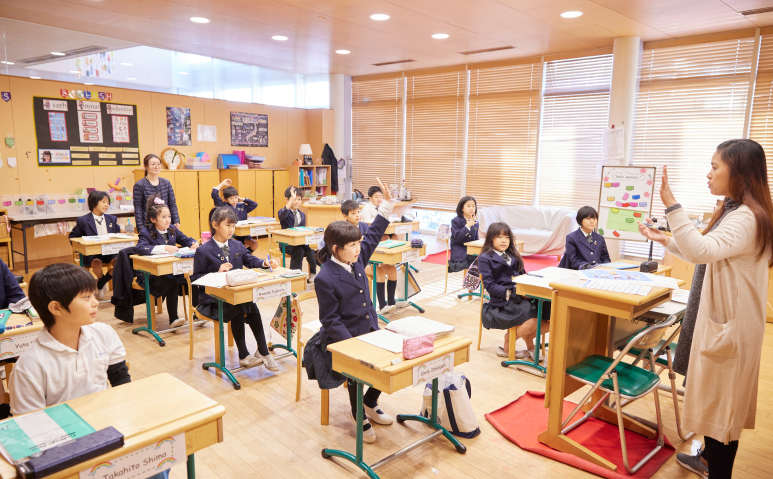
For the lower grades, it is important for students to familiarize themselves with and enjoy English. For example, by teaching vocabulary words with illustrations and using games and videos, the students have fun gradually increasing their vocabulary and acquiring such skills as spelling, pronunciation and grammar. In the upper grades, lessons are conducted in such a way as to get students to think about various topics and give presentations in English. They will also have English reading time to improve their reading comprehension. We, at Linden Hall, value the nurturing of a child’s ability to express their thoughts and ideas in English as we cultivate teamwork and friendship through group study.
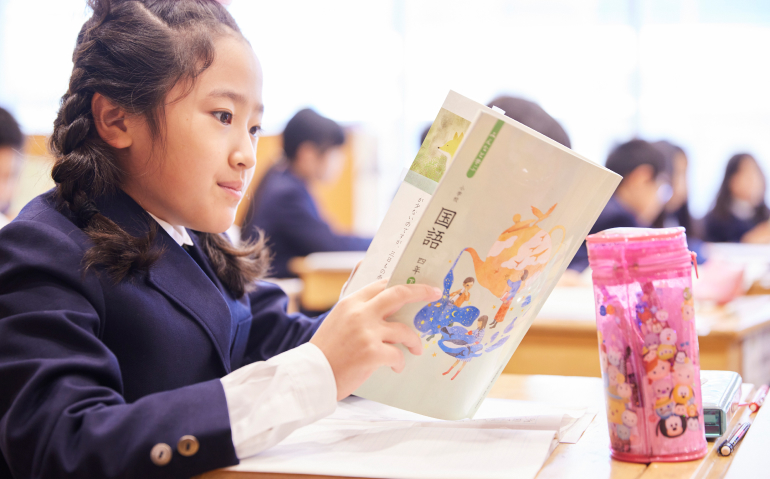
In Japanese class, students learn Kanji and how to read and write them, but one of our main goals is to have students develop the ability to logically organise their thoughts and convey them to others in an easy-to-understand way. Improving their thinking and writing skills is essential if they want to communicate their thoughts and opinions in a way that is easy for others to understand. For example, in newspaper-making class, students learn about the role that newspapers play in society, think about how to convey what everyone wants to know in an easy-to-read manner without being biased, devise headings, and present research with explanations using photographs and diagrams. During reading time, students gain an understanding of the structure of what is written in the book, develop reading skills while broadening their imaginations, and cultivate a love of reading. In addition, from the first year of the school, students start getting used to learning to look up the origin, usage and meaning of Kanji by using a dictionary.
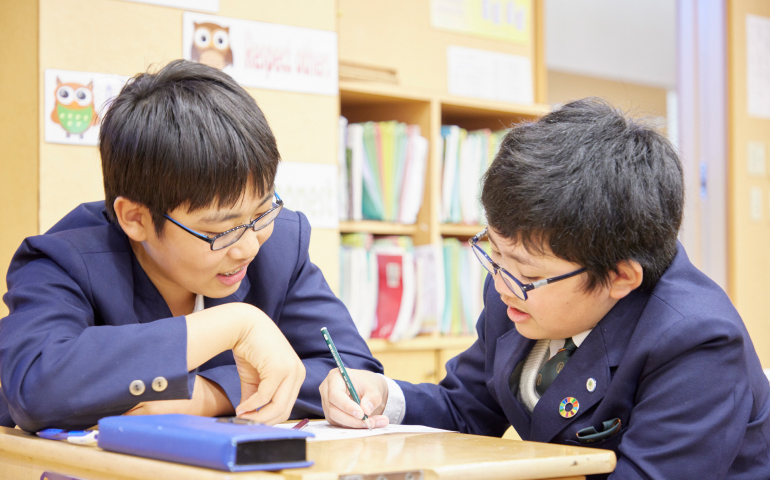
Math improves our ability to think logically and to analyse. Also, it is an important subject that is necessary for daily life. It is related to daily activities such as telling the time, thinking about quantities for cooking, and calculating money when shopping. We not only actively incorporate instructional learning into the classes, but also games that students can enjoy which help to cultivate a deeper understanding and mitigate any potential for developing a sense of dislike for it. In arithmetic, it is very important to learn the basics and to try and solve problems using various methods. By applying basic skills, the students can learn to solve complex problems.
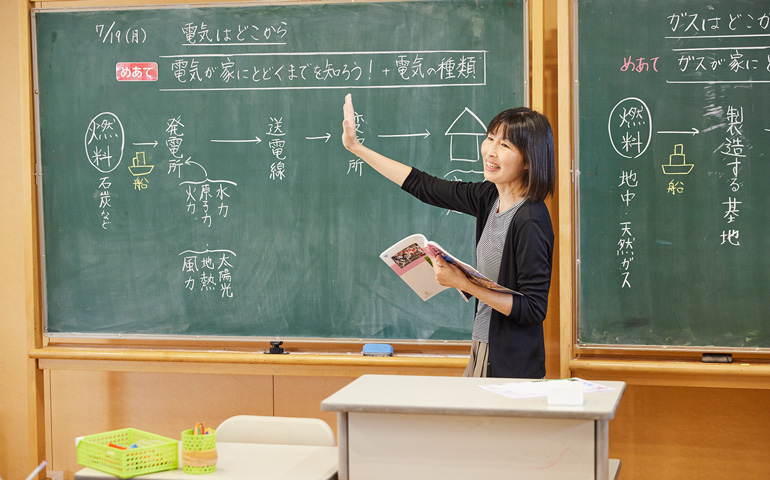
In social studies class students are taught the textbook fundamentals, but to further enrich their insight into society we also incorporate extracurricular and exploratory methods of study. Field studies, for example, include student visits to various public service facilities such as fire stations, police stations, and garbage disposal sites to get a deeper insight into the integral roles and important contributions these public service facilities make to their local communities and by extension have the students consider the relationship between themselves individually and the world at large. Moreover, to enhance their appreciation of diversity, each student studies and summarizes their knowledge of the culture, language, dwellings, clothing, food, and religions of various countries around the world and makes a presentation. In addition, we supplement the learning process with related videos for more in-depth, detailed, true-to-life insight into the global mindset. We know that the more sensory stimulation that we can incorporate in introducing students to new concepts the better. Visual input is a great addition to the learning process. The pièce de resistance is the English language study trip in the sixth grade which provides an opportunity for students to experience firsthand all the concepts that they will have been introduced to during their years with us.
* Social studies is taught from the 3rd grade and up.
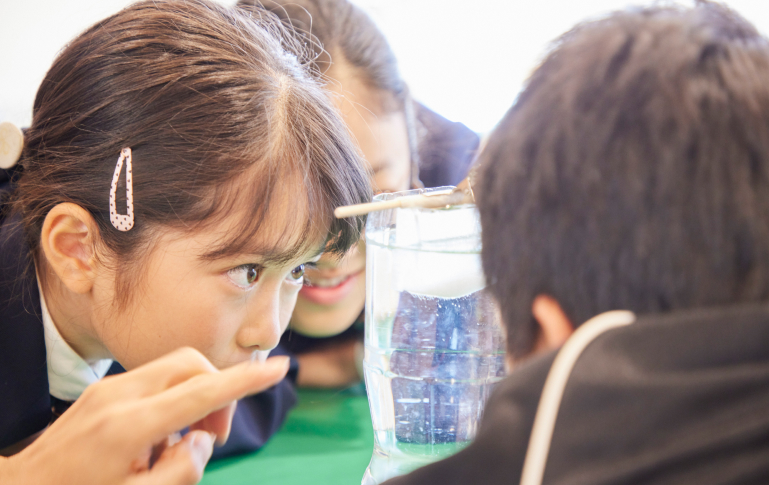
Our science classes focus on developing a deeper understanding of natural phenomena. We try to instill a love of nature and the environment. Children have a wonderful curiosity. We believe that by stimulating their curiosity, it can enhance their learning experience while having fun by incorporating a lot of observation-based activities and experiments into our classes. The study topics are all based in the familiar and can be experienced in daily life. Through observation and experiments, the students will gain a better understanding of the science behind a variety of phenomena such as plant germination, water evaporation, celestial bodies, and light and shadow. Since science is so much a part of everyday life, having a better understanding of it gives the students confidence and improves their capacity for logical thinking.
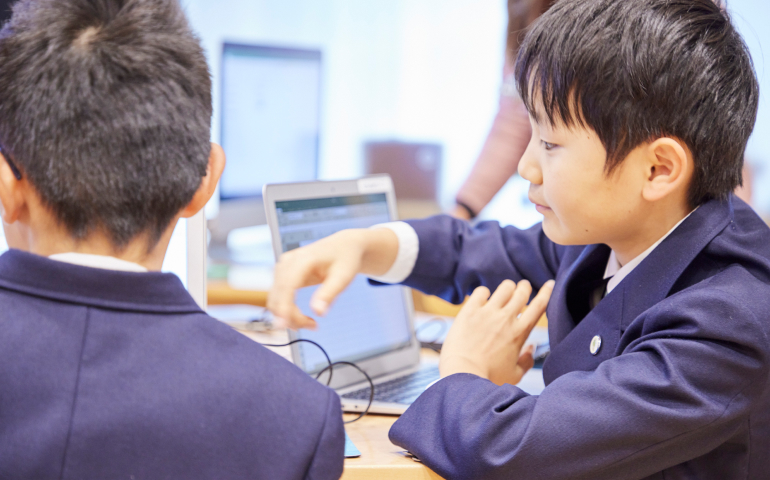
Starting at the elementary school level, we teach each student to use a computer to help them acquire the skills necessary for programming. In the lower grades, students learn basic PC terms through game-play. They gradually progress to programming and the fundamentals needed in the conceptualising of software design. The lessons are designed to help students acquire the ability to problem solve for themselves. Moreover, learning Word, for example, gives students the ability to write about their own experiences or write down their thoughts succinctly. Not only do we instruct elementary school students on how to use Word, but also Excel, and PowerPoint as well as they are essential for not only university life, but also for work life as well. They learn these skills through expressing their own ideas, interests, impressions and recollections; such as all the fun and great experiences they would have during their British language study tour, for example.
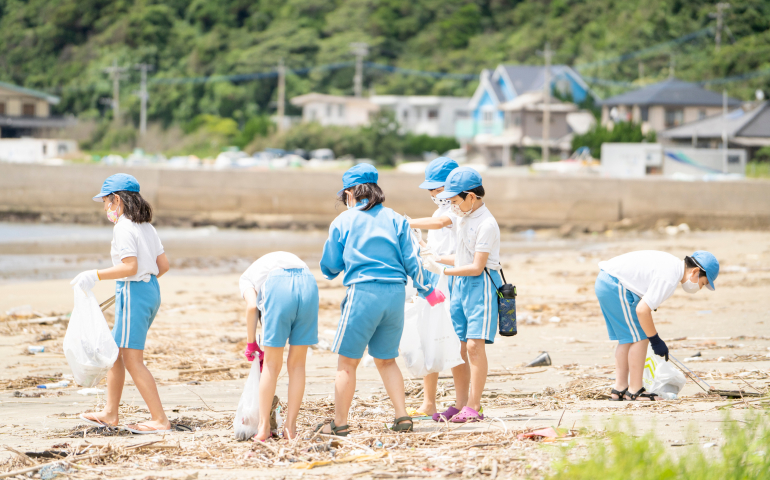
In this class students learn about their living environment as well as the natural environment. They study, discuss and think about what they can do to support and improve the environment. Furthermore, they enhance their learning through hands-on activities. As an example of hands-on learning, we put beach clean-up into practice; a result of our collaboration with German elementary schools who actively tackle environmental problems head-on and as an extension of our shared commitment to doing what we can to care for the areas in close proximity. The students have learned about what kinds of trash and driftwood, etc. are in the oceans, and have been encouraged to consider the impact of flotsam and jetsam on the global environment. Through these experiences, children's awareness of the environment is raised, fostering their readiness and ability to take action.
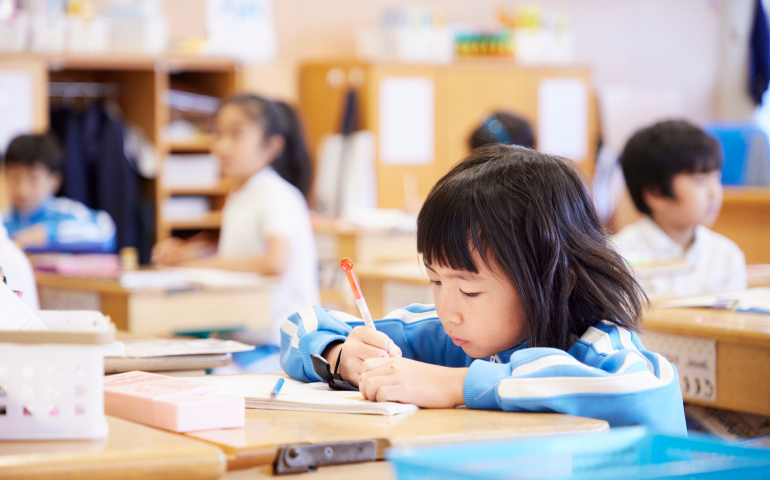
The purpose of our life skills class is to teach students a sense of gratitude and respect for the people who support them in their daily lives, and the importance of being responsible for their actions. For example, to grow Morning Glory, we need to water it every day. Students learn to take responsibility for the lives of animals and plants and understand that they will die if not taken care of properly. This naturally leads to respect for those people who are engaged in the raising of animals and plants. From the perspective of ‘Shokuiku’ or the food industry, they also learn how ingredients essential to their daily lives are delivered to us and served on the table, and cultivate a sense of appreciation for those involved in the process. By approaching these classes with familiar topics, we aim to raise the students’ awareness of the people who support them in their daily lives to foster feelings of gratitude.
*The course becomes social studies from the 3rd grade and up.
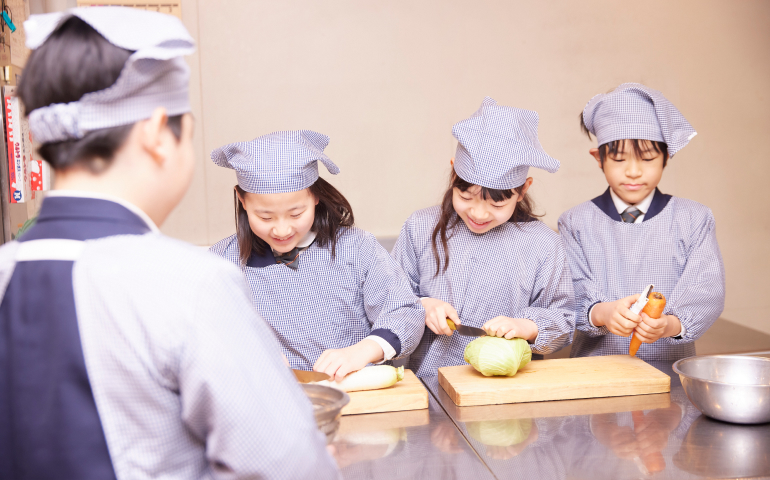
Students acquire the knowledge and skills necessary for daily life through various practical activities. For example, when planning a menu, instead of just focusing on cooking, each group will be asked to think of a nutritionally balanced menu and try to purchase what they need within a budget. Then the students get the opportunity to prepare small meal-samples and clean up after themselves in Linden Hall’s full-scale home economics kitchen. They learn about the importance of teamwork, how to meal-plan and to take responsibility for the meals they make through hands-on, true-to-life cooking experiences. In addition, as students try their hand at things like sewing and laundry on their own, they start to feel grateful for all the things that their parents usually do for them. As the name implies, this class provides students with a great awareness of "home-life".
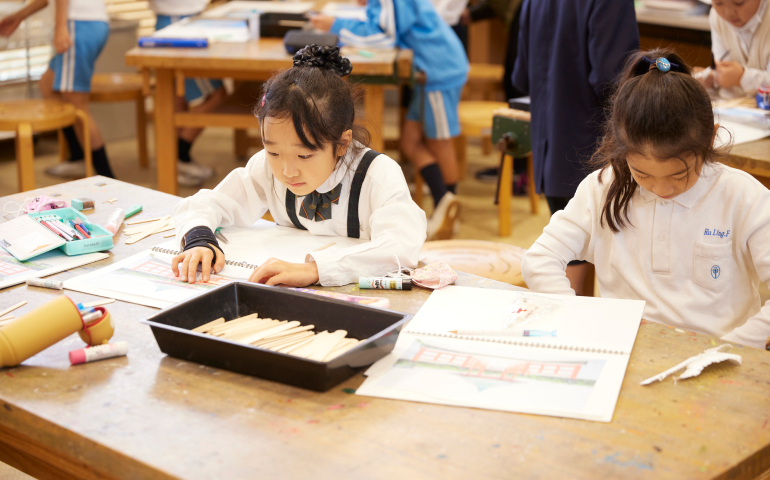
Under the instruction of foreign teachers, classes are conducted with as few restrictions as possible on self-expression. Classes place great emphasis on the enjoyment of free use of materials and creativity. We have a very creative curriculum including such classes as 3D art, the designing of stuffed felt animals, mixing colors using 2-3 primary colors and drawing pictures with primary colors. The teacher watches over the process with gentle guidance and support, talking the students through it, all the while encouraging them to build confidence and help students develop their individuality as they experience the joy of free-expression. In addition, students visit museums and art galleries to get a chance to see real works of art.
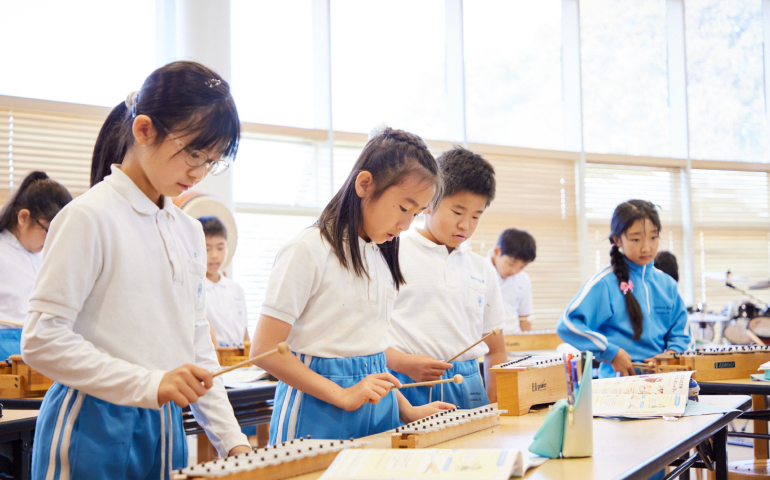
Linden Hall is proud to be able to offer expert musical instruction by a professional musician, who instructs all of the music classes at our school. Our students get the chance to experience music firsthand during their most formative years by singing and playing various musical instruments. As they advance through the years at our school, students will develop a positive attitude towards music while improving their abilities with group-practice and concert performances. Having a place to sing and perform in front of an audience is a great way to share the joy of music and build confidence. In our music classes, students also get the opportunity to try improvisation. This kind of training helps awaken the musical initiative and creativity of the students. During our classes, students get the opportunity to try out various instruments such as drums, guitars, Japanese drums, and other rare instruments that are not usually used in standard music classes. Another feature of the music classes at our school is that students get an in-depth look at the music styles and genres of various cultures through exposure to a variety of music from around the globe.
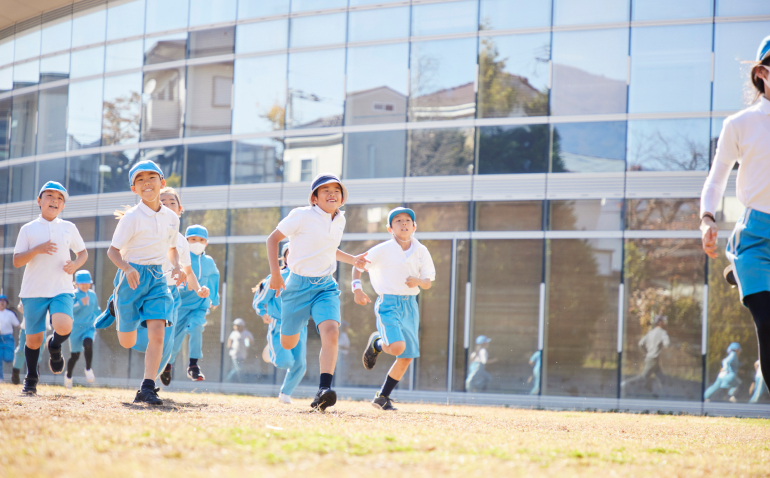
Here at Linden Hall we hold a variety of events in order to instill in students the love of physical activity. We provide such activities as dancing, cross-country running, ice skating, track and field events, ball games, horizontal bar, mat exercises, box-vaulting, and more, fully demonstrated by our sports instructors to introduce the joy of sport. Sports is character building. At our school, students experience sports in a bright and cheerful environment. They not only experience the joy of physical activity, but also the importance of teamwork, compassion for others, communication skills, the challenges of staying focused and engaged and the joy of overcoming obstacles and challenges. We introduce the students to various facilities such as gymnasiums, sports fields, swimming pools, etc. It is our hope that our students grow up knowing how to balance physical and mental activity, and that we provide them with a rich environment within which they can enjoy the fun of free, independent physical movements.
All children in 4th grade and up participate in extracurricular activities.
In addition to science, chess and basketball, the school invites external expert instructors to
teach such classes as gardening, Karate and Japanese dance.
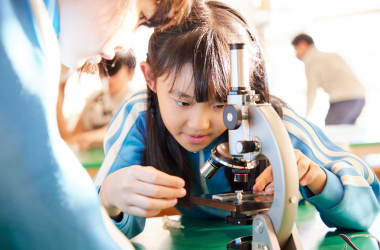
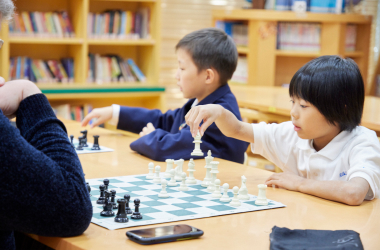
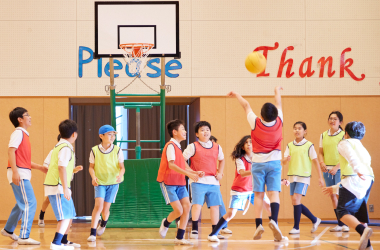
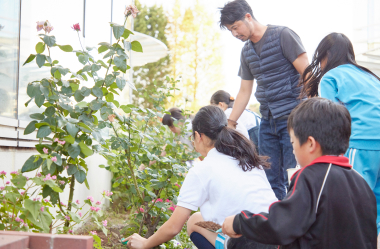
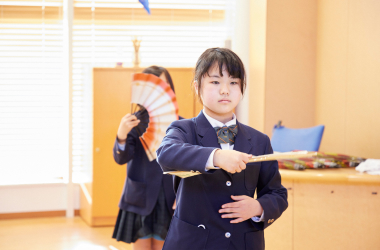
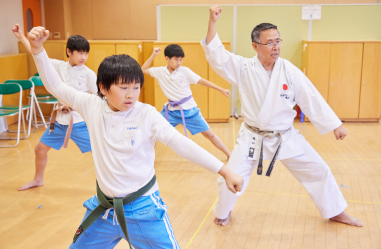

Loading